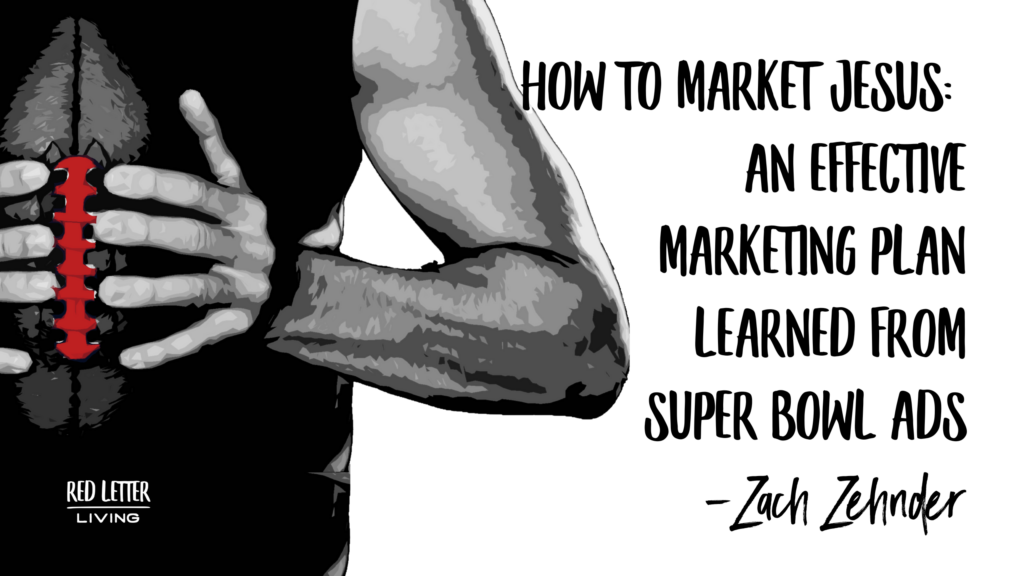

How much would you pay for a Super Bowl ad?
In 2025, with the rise of inflation and the popularity of the NFL, a Super Bowl ad for 30 seconds costs 8 million dollars! And it’s nearly impossible to get in, with ad space selling out months ahead of the game. Do these ads even work?
Bill McKendry is the Chief Creative Officer behind the He Gets Us campaign. He Gets Us, an organization trying to help people connect with Jesus, was either praised or blasted for its investment in Super Bowl ads from 2023. Some loved it. Jesus was in the big game. Some couldn’t believe a company would shell out that much money for 30 seconds. They argue that this organization could have given it to people experiencing poverty or to those in need.
Bill was a guest on a podcast, and he talked about the time he went into Five Hour Energy’s headquarters. Five Hour Energy had been a previous client of his. The first time he walked into their lobby, he noticed no artwork on the walls in the lobby. It was just bare. Except he saw one thing—a tiny article from USA Today in a massive frame. So, his attention was drawn to this article.
When he got close enough to see the article, it ranked the previous year’s Super Bowl ads. At the very bottom, voted the worst ad of the Super Bowl, was 5-Hour Energy’s.
He was left wondering why in the world they would display this. Then, right next to the article, he found one little brass plaque next to the frame, which said, “But our business went up astronomically right at this time.”
Even the worst advertiser in the Super Bowl has a very positive impact. People who invest in a Super Bowl ad expect a return on their investment, and they get one. What the Super Bowl ads prove to us is that marketing works. Period.
If marketing works, is it possible to market Jesus? How would we do this?
In this blog, we will form a 3-step marketing plan to help you and your church market Jesus.
An effective marketing team begins with identifying a problem and demonstrating how a product or service can address it. To discover the problem, a marketing team will typically conduct market research.
In Omaha, NE, where I live, Within Reach and Barna Research Group just completed a citywide research study on the state of Christianity in our city. We’ve never had more comprehensive data on Christianity in Omaha. The study reveals that while 67% of people in Omaha believe in Jesus, only 16% are practicing Christians. This statistic raises two critical problems:
The overarching problem is that 5 out of 6 people in Omaha are settling for less than what Jesus has provided, which the rest of the study shows how that has negative impacts on our collective mental health and well-being. If this is true in Omaha, I’m sure it’s also true in your city.
So, here is the major problem we are all facing in Western Christianity:
Now that we know the problem, an effective marketing team will then move to provide a solution.
The solution lies in recognizing that Jesus is the answer to these problems. Quoting His own words from John 10:10b, “I have come that they may have life, and have it to the full.” Only Jesus can give us life to the fullest. So, He is the answer, but how do we get this answer out to the world?
The number one question that good marketing teams ask before forming their strategy is the WIIFM question. It stands for “What’s in it for me?”
In other words, a marketing team will always think about what’s in it for the person on the other side of their marketing efforts. So, likewise, our strategy to get the message of Jesus out there must help people with their real-world problems. We must show them how a belief in and a life committed to Jesus will bring them a life to the fullest.
To those who don’t believe and live with no confidence or false hope, how can Jesus offer a genuine hope that allows them to live confidently? To those who believe but are not following, how can Jesus provide a way for life beyond chasing after success and keeping up with the Joneses, which is exhausting?
Jesus fights against all of the problems that we face in this world. He brings peace that passes understanding, provides calm in the storm, offers hope even in loss, and combats loneliness by giving a real relationship with the God of the Universe. Not only this, but when we follow after Him, we live with purpose, meaning, and significance. This type of life combats so many of the things our culture pushes on us that move us to depression, loneliness, and burnout.
While Jesus is the answer to the problem, you and I are critical in the delivery of the answer. Throughout Scripture, the Bible declares that you and I are God’s marketing team.
2 Corinthians 5:20 says: We are therefore Christ’s ambassadors, as though God were making his appeal through us. We are each a billboard for God’s.
You are God’s representative. You are God’s marketing plan, and there is no Plan B. How you live can help bring people into a relationship with God.
So, with Jesus being the solution to the problem and we being His ambassadors, how can we get the message and the benefits of a life in Christ to as many as possible?
As part of the market research for the State of the City, I was blessed to serve on the evangelism team. Collectively, our team interviewed more than 60 local pastors to find common obstacles, share best practices, and discover opportunities that may exist.
After all of these interviews and siphoning through the data, the one significant finding was this:
Nothing helps people discover life to the fullest more than when followers of Jesus share their own stories.
More than anything else, when it comes to marketing Jesus, telling your story is the most important thing you can do.
The strategy, therefore, is to leverage the power of personal stories. This strategy is nothing new.
In Luke 8, we encounter a powerful story of one of the first evangelists, who, moments before announcing good news, was freed of demonic possession by Jesus. After healing the man, Jesus instructed him to return home and share what God had done for him. At once, the man listened and began sharing his story.
In John 4, we encounter the longest recorded one-on-one conversation Jesus has with another human being when he befriends a Samaritan woman at a well to collect water. In those days, Jews did not associate with Samaritans. It was uncommon for a rabbi or a Jewish teacher to talk to another woman in public, especially if they were not living according to Jewish moral or ethical standards. The story shows that the Samaritan woman was entangled in a life of sin.
Unexpectedly, she experienced Jesus’ unconditional love when Jesus befriended her and restored her dignity and purpose. As a result, she immediately began to share how much God had done for her!
Neither the demon-possessed man nor the Samaritan woman had extensive biblical understanding or theological training. Very simply, their lives were changed by Jesus, so they shared what He had done for them. They were less concerned with the proper presentation and more about celebrating what God had done in their lives.
Their stories resonated with what we have already known. Stories are more effective than sound doctrine. I’m all for sound doctrine, of course, but if we aren’t speaking the language of the culture or the city, the message can often be missed. I have usually found that others may want to debate theology or doctrine, but nobody can debate your story.
We must discover the power of the story!
You might ask, Does my story even matter? Absolutely! Your story has the potential to change lives. Revelation 12:11a says, “They triumphed over him by the blood of the Lamb and by the word of their testimony.”
There is no more powerful story than a person who has been changed by the grace of Jesus Christ!
How do we overcome the enemy? It takes two things:
1) the blood of the Lamb, and
2) the word of your testimony.
When we combine what Jesus has already done for us and share our story of the difference He has made in our lives, not only do we destroy the enemy, but we give opportunity for others to be forever changed by Jesus.
Here’s your challenge:
If you are struggling with where to start, answer this question, “What difference has Jesus made in your life?”
Marketing Jesus is not about selling a product but sharing a life-changing message. We, as believers, are part of a strategic marketing team and plan to address the problems of unbelief and inactive faith in our community. By embracing our role as God’s marketing team, we can use the power of personal stories to inspire faith, overcome challenges, and collectively lead others to live to the fullest in Jesus Christ.
So, let’s take up the challenge, share our stories, and be the best marketing team for Jesus that we can possibly be!
